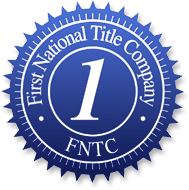Three tips for a smooth closing

Once you’ve found a new home and the property is under contract, you’re just a short time away from moving in! But there are a lot of preparations left to be made before closing, and it’s crucial to find the right professionals who will help you as you approach the finish line. First National Title (FNT) is Arkansas’ largest independent title and closing company, and we’re ready to help you with your upcoming home purchase. We have 25 locations throughout The Natural State, and you’ll always get to work with an agent in or near your community. We’re not owned by a financial institution or real estate agency, and our professionals always work diligently to provide the best service possible for our clients!
First National Title has Proudly Served Homeowners in The Natural State since 1997!

Whether you’re purchasing your first home or your “forever” home, it’s important to hire professionals who will be in your corner from the very beginning! It’s a big financial move, and it just might be the place you’ll call home for decades to come. First National Title (FNT) is Arkansas’ largest independent title company, and we’re committed to providing legendary customer service to every client, regardless of the sale price of their property.
Three tips to protect you from fraud at closing

A lot of money changes hands each time a property is sold, and plenty of criminals are interested in intercepting that money along the way. A new home or investment property is the biggest and most important investment that most people make in their lives, and you can’t afford to leave anything to chance with so much at stake. Almost a quarter of a million consumers fall prey to phishing scams and wire fraud yearly, but criminals are no match for vigilant consumers who take the proper precautions!




 First National Title Company has been verified by a 3rd Party, Erwin & Co., to be in compliance with ALTA Best Practices. Click the ALTA logo to see the Erwin & Co. report.
First National Title Company has been verified by a 3rd Party, Erwin & Co., to be in compliance with ALTA Best Practices. Click the ALTA logo to see the Erwin & Co. report.
